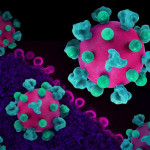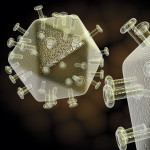A new integrase inhibitor being developed by GlaxoSmithKline in collaboration with Osaka, Japan–based pharmaceutical company Shionogi & Co. was well tolerated and associated with “unprecedented antiviral activity” in a 10-day study, reported Tuesday, July 21, at the Fifth International AIDS Society (IAS) Conference on HIV Pathogenesis, Treatment and Prevention in Cape Town.
S/GSK1349572 (GSK-572), currently in late Phase I, early Phase II development, has demonstrated promise in early laboratory studies. First, it will only need to be taken once a day and without a boosting agent; Merck’s Isentress (raltegravir) currently requires twice-daily dosing, whereas Gilead’s experimental once-daily compound elvitegravir requires a low-dose Norvir (ritonavir) booster. Second, test tube studies suggest that GSK-572 might work against HIV that has become resistant to Isentress or elvitegravir.
The study reviewed at IAS by Sherene Min, MD, of the University of North Carolina at Chapel Hill and her colleagues explored GSK-572—used without other antiretrovirals (ARVs)—over 10 days, compared with placebo, in 30 HIV-positive individuals who had not yet used an integrase inhibitor. Three doses of GSK-572 were evaluated: 2 mg, 10 mg or 50 mg, all taken once a day. Eight patients in each dosing group received an active drug; another two received a matching placebo.
On day 11 of the study, one day after the last dose of medication was given, changes in viral load—averaging 4.1 to 4.5 at the start of the trial—ranged from a 1.51 log/copies drop in the 2 mg dosing group to a 2.46 log copies/mL reduction in the 50 mg dosing group. Conversely, in the placebo group, average viral loads increased slightly.
Min heralded these data as suggesting “unprecedented antiviral activity.” In a quick and somewhat sly comparison with other integrase inhibitors—specifically Isentress (raltegravir) and elvitegravir, neither of which were used as comparisons in this study—Min pointed out that GSK-572’s affect on viral load appeared notable. In previous 10-day studies of Isentress and elvitegravir, average maximum viral load reductions were 1.7 log and 2.03 log copies/mL, respectively, compared with GSK-572’s average maximum viral load reduction of 2.46 log copies/mL.
The majority of patients taking GSK-572 for 10 days were able to decrease their viral loads to below 400 copies. This occurred in about 56 percent of those in the 2 mg and 10 mg groups, whereas it was documented in 90 percent of those in the 50 mg dosing group. In the 50 mg group, 70 percent got their viral loads below 50 copies.
No mutations in HIV’s integrase enzyme conferring resistance to GSK-572, Isentress or elvitegravir were found.
No severe side effects were reported, and no volunteers withdrew from the study because of an adverse side effect. The most common adverse side effects, at least in this 10-day study, were diarrhea, fatigue and headache. Except for headache, which occurred more frequently among those taking GSK-572 (20 percent of those in the 50 mg dosing group), similar adverse effects were observed in both the treatment and placebo groups.
Min noted that these encouraging preliminary findings support ongoing research. She said that a Phase IIb clinical trial involving a 50 mg tablet is expected to begin this month.
Advertisement
Advertisement
Advertisement






1 Comment
1 Comment